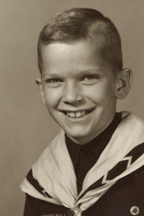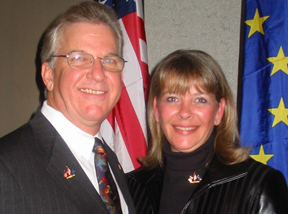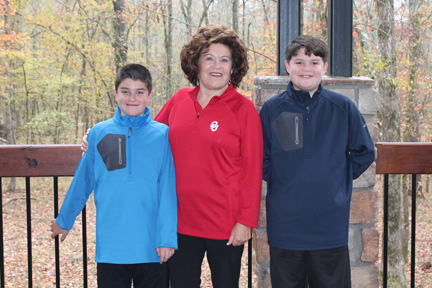Honoring Excellence
The Only Constant Is Change
PPAI honors Steve Slagle as its 2016 PPAI Hall of Fame Inductee
By Jen Alexander
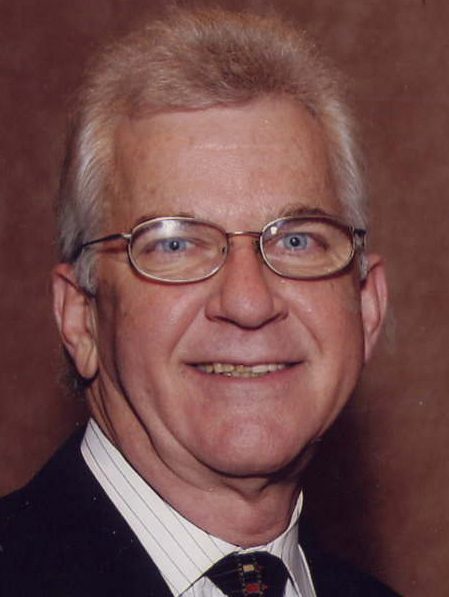 In the midst of changes that might shake any other industry to its core, Steve Slagle, CAE, kept PPAI and its promotional products business members on a steady course toward continuing growth and success. Slagle, who served as the Association’s president and CEO from 1996 to 2012, is being honored as the 2016 PPAI Hall of Fame inductee.
In the midst of changes that might shake any other industry to its core, Steve Slagle, CAE, kept PPAI and its promotional products business members on a steady course toward continuing growth and success. Slagle, who served as the Association’s president and CEO from 1996 to 2012, is being honored as the 2016 PPAI Hall of Fame inductee.
He helped lead the Association through major changes as it worked to move the industry forward against a tide of changing consumer habits and the explosive growth of technology, including the internet boom. His calm, somewhat reserved demeanor belies his passion for promotional products businesses and the association that serves them.
Slagle graduated from the University of Tennessee with a journalism degree that focused on advertising and marketing. After graduation, he served two years in the U.S. Marine Corps, after which he enrolled in graduate school, again at UT. His first job in association management came in 1977 when he joined the National Association for Campus Activities in Columbia, South Carolina.
“For five years I was the director of communications and I edited a magazine, and I later left to work for an advertising agency. I was invited back to NACA where I was hired as executive director, a position I held for 13 years. I really enjoyed it those years and I decided association management was my career choice.”
When the opportunity to work with PPAI came along in late 1995, Slagle says, “I really felt like I was in the right place. I wanted to work with an association that represented small-business owners, entrepreneurs, and marketing professionals, and PPAI was the perfect match. I left an association that was much smaller, but I quickly learned it’s all relative. My first impressions about PPAI and the industry came just two weeks after I was hired when I attended the PPAI Winter Show, as the Expo was then called, in Dallas. I was incredibly impressed with the array and diversity of products being exhibited,” Slagle recalls. “I was really struck by the size and scope of the show, and with the people I’d met. I remember being interviewed by the search committee and having the feeling PPAI was on the verge of significant change … the industry was beginning to be challenged by technological changes. As the internet allowed buyers to have access to more information in the mid- to late ‘90s, the best-kept secrets about the industry were being exposed.”
Slagle adds that competition became more challenging to PPAI in the late ‘90s and early 2000s, especially in the trade show arena and in membership services.
“Everyone was competing for dollars in the marketplace. But we became better because of it. We changed as the industry changed,” he recalls.
With an eye on the future and a passion for making the present profitable for members and the Association, Slagle teamed up with volunteer leaders to launch new products and services, and to forge stronger relationships with industry groups including the regional associations.
“We looked at things other associations had done that PPAI had not tried. When I first joined PPAI, we didn’t have a sales team or a marketing team. Our staff was more “order takers” than “order makers” and it took awhile for both our board and our staff to become more competitive and aggressive in our approaches. We had to bring more of a sense of urgency to the competitive changes we faced.”
Some things we tried didn’t work, and not everything was successful,” says Slagle. “We struggled to find technology tools that our members wanted and needed, but PPAI finally got it right by partnering with a company that was already providing valuable technology tools to the industry–and that was SAGE. I’ve always been a believer that if you don’t have a few failures along the way, you’re not really trying anything new. I tried to keep our focus on having the Association be relevant to its members, and I believe we did a pretty good job of that through the years.”
One of the industry’s most significant competitive decisions came in 2003, when The PPAI Expo relocated from Dallas after 26 years to Las Vegas. And the preparation leading up to the shift proved just as monumental, Slagle says.
“We had made the commitment to compete aggressively in the marketplace, and there came a point in 2001-2002 when we were trying to figure out how to better position our premiere trade show. As a group, we believed we needed to consider moving the Expo to generate better attendance and more excitement, so we moved the Expo to Las Vegas.
“We finalized the decision in one month, just nine months before the show’s launch in 2003. There was a huge risk involved—a lot financially, but also for our reputation,” he says. “When we finalized the decision, the facility [Mandalay Bay Convention Center] wasn’t complete. So we had all these contingency plans. That’s a significant tactical decision, but our staff executed the plan really well. I was really proud of our board and our staff for making the decision pay off.”
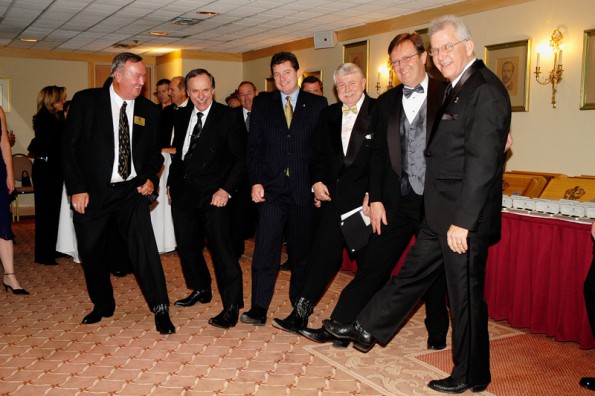
Slagle says none of the Association’s progress during his tenure would have been possible without volunteer key volunteer leadership and commitment.
“It seemed like we always had just the right volunteer leaders in key positions to help lead the Association when challenges arose. PPAI is blessed with terrific volunteers, and the list of those I had the pleasure of serving with is far too long to mention. We also had a terrific staff, people I leaned on through the years, including more recently Paul Bellantone and Bob McLean,” he adds. “I was really blessed to have so many very skilled and competent professionals to work with over my 16 years at PPAI. Without a doubt I can say that almost everything I accomplished or was given credit for was done in partnership with volunteers and staff.”
Among the numerous accomplishments that occurred during his tenure, he is particularly proud of pursuing and establishing an international outreach, including founding and participating in a federation of international promotional products associations starting in 1999, visiting numerous trade shows throughout the world, and eventually visiting factories, trade shows and product testing labs in Hong Kong and China in the mid-2000s. “When product safety became a major issue for consumers and buyers of promotional products just a few years ago, PPAI was ready to help its members,” he says.
Slagle recognizes the elite company he now keeps as a member of the PPAI Hall of Fame. “While I don’t personally know every individual inducted into the Hall of Fame, I was fortunate to meet and work with a lot of them. I have tremendous respect for these men and women, as they are incredible individuals who’ve made incredible contributions to PPAI and the industry,” he says. “I’m really proud and pleased to have been inducted and to be considered worthy of joining these accomplished individuals in the Hall of Fame.”
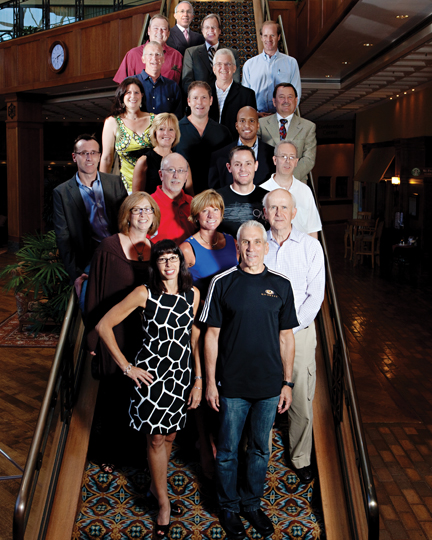
The Connector
PPB talks with Teresa Moisant, MAS, winner of the 2016 PPAI Distinguished Service Award
By Julie Richie
After working in sales in the corporate world for many years, Teresa Moisant—a self-proclaimed workaholic—started to question whether she was in a place where her talents were going to be valued long-term.
“I knew some women in the promotional products industry, and I saw what they were doing and knew I could be successful,” she says. Plus, she says, her late husband, Bill, pointed out that if she was going to be a workaholic, she should work for herself. The two combined forces to start Moisant Promotional Products in 1990.
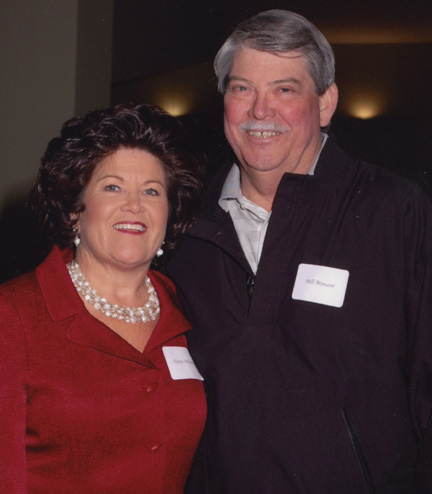
While Bill focused on the financial details—“he had a form to design a form”—Teresa brought her sales skills and big-picture thinking to the table. It was a great match. Bill passed away suddenly in 2007, but Moisant continued to run the business and now both of her daughters, Christi and Shelly, work with her and manage the company.
“I love sales and I’m a huge sports fanatic,” Moisant says, having grown up with four brothers. “I grew up being very athletic and very competitive. Sales is very competitive. You can measure whether you’re getting a bunch of first downs, or a touchdown or a championship or a national title. I’d probably be a good coach. I know how to motivate and I’m passionate. Those are the qualities of a good CEO as well as a good coach.”
They Call Her Mom
Moisant was brought up with the adage, always do something nice for someone every day. And, she says, it came very easily to her. “I just can’t not help people,” she says.
Mentoring others is one of the ways she helps. She observes young people in the industry and watches who takes the time to care about others. “Those are the people I help. There are a lot of 40-ish guys—and some women—in the industry whom I have mentored that call me Mom,” she says. And she’s serious.
“The reason mentoring is so important to me is because I was mentored. I had great mentors early in my career. They took the time to share with me and it made me feel a deep commitment to mentoring.” She even mentors her 9- and 11-year-old grandsons, Fletcher and Hudson, imparting life lessons with every outing to a sporting event. Once she was even brought in for show-and-tell in Fletcher’s kindergarten class. She taught the class how to shake hands and look someone in the eye. “Some of those kids still come up to me and shake my hand,” she laughs.
Three Rules
In 2010, Moisant had the opportunity to hear famed football coach Lou Holtz speak, an experience she says changed her life. “I used to spend hours thinking about ways to beat the system,” she says. But in his speech, she recalls, Holtz said you should live by three simple rules: 1) Do the right thing; 2) If you’re going to do something, give it 100 percent; 3) Treat all people with respect.
“Living by those three rules has simplified my life,” she says. “When you’re always doing the right thing, you never have to spend time worrying about how to beat the system.”
Connecting Others
With her outgoing personality and enthusiasm, Moisant is a natural connector. She’s constantly helping others find people who can meet their needs. “Even my grandsons know it. When their school needed some fencing donated, Hudson stood up and said, ‘Call my Nana. She knows people.’”
And receiving the Distinguished Service Award leaves her feeling flattered. “To be honored in the industry and to be recognized by your peers is so important. This award is really about taking the time to do something nice for someone and ask, ‘Who can I connect to make their lives better today?’”
Coming to Expo every year is a great opportunity, Moisant says. “Some people like to go shopping. I like to go to Expo because I love [promotional] products. It’s the ultimate shopping experience for me. I can’t imagine not going to Expo if you’re in this industry.”
An Obsession With Service
Bruce Felber, MAS, explains what fuels his avid volunteerism
By Tina Berres Filipski
For many, the secret to a happy life comes from their service to others. Among those who would agree is this year’s PPAI Distinguished Service Award winner, Bruce Felber, MAS, corporate brand specialist for Holland, Ohio-based distributor The Image Group (UPIC: IMAGEGRP). Surprisingly, his 30-plus years as an industry volunteer started simply because someone asked him to help out.
“My brother, Robert, and I were at the 1984 PPAI Winter Show in Dallas and someone asked if we would stand by a door on Education Day and hand out forms and direct people,” he remembers. The satisfaction of feeling involved struck a chord and Felber decided to take the next step and get involved with his regional association, Specialty Advertising Association of Northern Ohio (now Ohio Promotional Professionals Association). One day, while suggesting a few improvements for the regional’s trade show to friend and fellow member Larry Wise, Felber was asked, “Would you serve as chair of the trade show?”
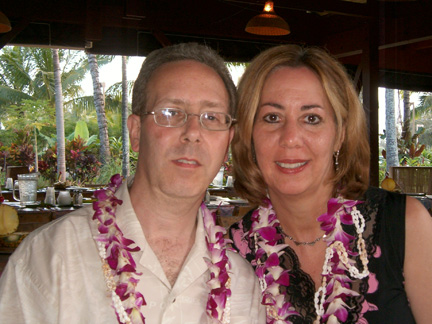
He took on that role and found satisfaction in helping to turn the show around. From there, he set his sights on running for the regional board—and was elected. One of his first goals was to change the name of the association to reflect a broader purpose, and over the next 17 years Felber served on the OPPA board, twice as president (in 1995 and 2001), and spent five years as chair of the education and the trade show committees. In 2008, he was honored with induction into the OPPA Hall of Fame.
Like many industry professionals, Felber discovered the industry by accident. His father owned a company that manufactured sample books for the textile industry and, in his teens and early 20s, Felber worked for the company on weekends and holidays. When his father passed away suddenly in 1982, Felber found himself running the business. “It was a bad time in the country,” he says. “We had 150 people working two shifts. We were getting squeezed on pricing. The family decided to sell the business.”
He woke up that next Monday morning and asked himself, “Now what?” He had graphic skills and knew how to sell so he worked a lead from a friend in the screen-printing business and sold 100 leather binders. At that point, he knew he was on to something.
Felber discovered promotional products suppliers in a copy of PPB magazine and over time built his book of business and opened a distributorship. His brother joined a few years later and Felber & Felber was formed. It was also at this point that he learned about PPAI, joined and took his volunteer service to a new level.
Ask Felber why he chose to get involved in PPAI leadership and the answer comes easily. “It was probably a selfish reason at first because I wanted to educate myself and meet other industry colleagues,” he says. “But then I found I really liked the Association and the staff.”
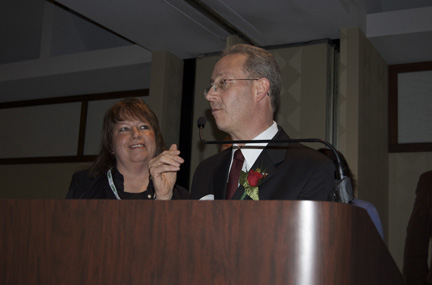
Like his interest in improving OPPA’s trade show, Felber was passionate about what he could do to enhance the industry’s reputation and PPAI’s brand image so, after serving on several PPAI committees, he volunteered for the Public Relations Committee and served as chair for two years. “I always wanted to get on the PR committee because I didn’t like the way our industry was perceived on the open market,” he says. “The Association has done a lot over the years to change that perception.”
During his long industry career, he has also provided leadership to PPAI as a member of the Distributors Committee and Technology, Terminology & Standards Committee, the PPB Editorial Advisory Council, Awards Advisory Council and the PR Advisory Council. For three years he served as board trustee for the Promotional Products Education Foundation and for four years as a member of the PPAI Board of Directors, which included terms on the Budget & Finance Committee, Nominating Committee and Executive Committee. He currently is a member of the PPAI Certification Committee and the Public Relations Advisory Group.
A lifelong learner and avid educator, Felber has been active as a webinar presenter and a speaker at The PPAI Expo and Expo East, presented on behalf of the Promotional Professionals Mentoring Network, conducted instructor training and contributed articles to PPB magazine, Print & Promo magazine and the former Corporate Logo magazine. He was also an early PPAI Ambassador speaking at colleges and universities about the value of promotional products.
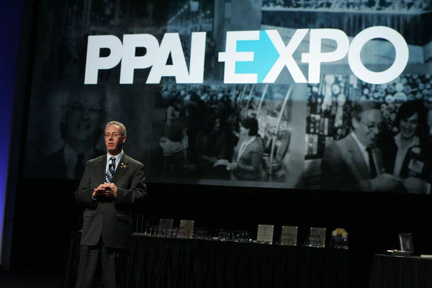
Although committee work has its challenges (“Sometimes people don’t take their roles seriously or are on a committee for the wrong reasons,” Felber says), he admits he has seen many more victories than defeats through volunteering. Among the victories he counts the many friendships he’s made that have lasted through the years and brought about new opportunities, such as his partnership with fellow distributor Joe Scott, MAS, to teach classes for the Promotional Consultant Academy in 2011. Another victory he was involved in was developing OPPA as one of the top regional associations and helping to hire the person he calls “the best executive director,” LaDonna Belcher. “We reinvented the whole association,” Felber says proudly.
It was through his connection with PPAI that he was introduced to Jon Levine, president of The Image Group, through past PPAI Chair Bob Davis. In 2010, Felber joined the Image Group as director of marketing and sales support.
“This industry is a great place to meet people,” he says, adding that the old saying—you get out what you put in—is true. “People don’t take advantage of the network we have. My best advice is to get involved—you are going to learn by helping others and meeting people you won’t meet in any other environment. You’ll find distributors you can collaborate with and suppliers you can team up with.”
He’s also a passionate believer in the value of what one can learn from others. “People shouldn’t be going to Vegas just for the trade show,” he says. “It’s a meeting of the industry. If you miss the education and don’t attend the social sessions, you are missing what this industry is all about.”
“I want people to understand that volunteering is the lifeblood of society,” he adds. “It’s not always about you but what you can do to help other people.”
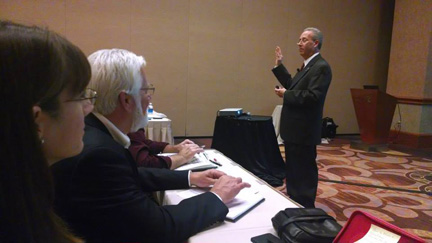
Planting Seeds Of Service
PPAI honors the servant leadership of Mark Gilman, CAS, with its H. Ted Olson Humanitarian Award
By Jen Alexander
PPAI’s 2016 recipient of the H. Ted Olson Humanitarian Award is proud to have called just one town his home for nearly all his life. But before Mark Gilman, CAS, became a permanent resident of Shawnee Mission, Kansas, life was a bit nomadic.
“My family came to this area in 1945 at the end of World War II; I was in the eighth grade. Before then, I hadn’t gone to the same school for more than a couple years.” Once his family planted their post-war roots in the Shawnee Mission community, Gilman was comfortably at home.
In 1962, after two years in the Army and graduate school in California, plus a brief stint teaching at San Francisco State College, Gilman returned to Kansas with his wife and high school sweetheart, Nancy, to work at her father’s company, Gill Studios. “Specialty advertising at the time was in a period of robust growth,” he says.
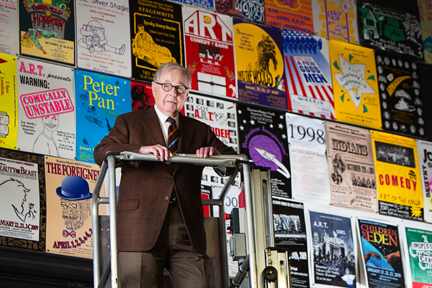
And Gill Studios grew along with it; from Gilman’s earliest days working alongside Forest Gill and an administrative assistant, to the company’s present numbers of nearly 350 employees and 250,000 square feet of operational space. “All that time, I’ve been mainly involved in sales and marketing. I’m nearly 83 and I’m still allowed to come in, and I try not to cause too much trouble. I see myself as representing the shareholders—Nancy, her brothers Bruce and Don, and their kids. The company has been good to me.”
And Gilman, in a lifelong show of gratitude to the community that he joined so many years ago, has passed along that goodness to others. “In the early 1960s, the interstate highways were built to bring people into cities, but they also made it easy for people to leave and come out to the suburbs. Shawnee Mission was the closest Kansas suburb to Kansas City,” Gilman says. Situated in Johnson County, Kansas, Shawnee Mission experienced boom times in the late 1950s and 1960s. With the rush of growth came a rush of community challenges. Simply put, essential community institutions like hospitals, libraries, and schools were lacking. So Gilman got involved.
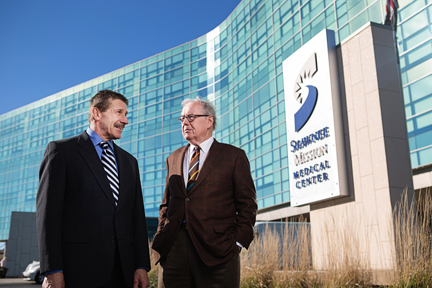
Gilman’s brother-in-law, Bruce, practiced medicine at what was then known as Shawnee Mission Hospital. In 1966 the hospital held a capital campaign, for which Gilman volunteered. “It’s hard to grow (as a community) when you don’t have good health care,” he says. His volunteer role morphed into a place on the new hospital’s foundation, where Gilman is the last original member from the early campaign days.
Gilman and the other hospital supporters also aided child-care visionary Lee Ann Britain in her mission to assist children with disabilities and their families by providing her space in the new hospital for what is now the Lee Ann Britain Infant Development Center. “Her goal was to prepare these children to go to school. This was what galvanized our foundation.”
The hospital has since become “a force of life in the county,” says Gilman. “It’s one of the largest and most successful in the greater Kansas City area.”
Gilman has also spent many years fueling his passion for arts and the theater by supporting local organizations and his high school’s performing arts department, and by serving in leadership and support positions for area arts groups such as the Missouri Repertory Theater, The Barn Players, the Quality Hill Playhouse and the Carlsen Center at Johnson County Community College.
“For many years I have had my company print and donate posters to the Theatre Department of Shawnee Mission North High School. The artwork for the posters is supplied by the students or their teachers,” says Gilman. “The students have saved at least one copy of almost every poster we have made, and the posters have been stuck on the walls of one of the classrooms of the school. The SM North Theatre Department has won many awards and accolades over the years for the terrific work the students and faculty turn out.”
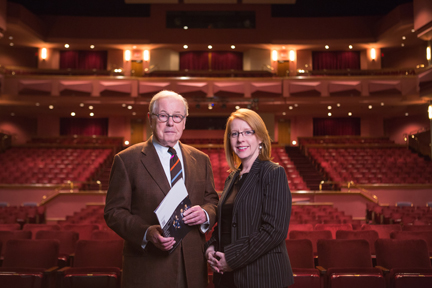
Gilman’s humanitarian work extends as far into the promotional products industry as it does his hometown. He has served as a PPAI board member and board chair, and supported the Promotional Products Education Foundation. “I worked with Wayne Greenberg when he led PPEF to get the Vincent J. Arena Scholarship started,” says Gilman. “It’s important to me because Vince Arena was a friend. He was very influential in my career within PPAI, and I was able to honor his memory by naming the scholarship for him. It may not have been the first such scholarship, but it did encourage other donors to follow suit.”
Gilman sees his own penchant for helping others reflected by the industry and its members. “I think our industry is tuned into the idea of encouraging charitable activity in the community,” he says. “I’ve always been impressed with the sense of sharing in the industry. And many products and services are actually intended to help market charitable causes.”
While he hesitates to allow others to recognize his own charitable actions, Gilman cites the humanitarian award’s namesake as his reason for accepting the honor. “The reason I said yes was because of Ted Olson. I knew Ted—back in the day when we needed to hire a new [Association] president, it came down to Ted and one other candidate.
“That candidate was polished and articulate, and he had gone out of his way to learn about the industry,” Gilman says. “Ted didn’t profess to know as much, and hadn’t had quite the same experience, but there was a genuine sense about him—of basic honesty and quiet determination. I always thought of Ted as being the consummate servant-leader. He was selected to lead, but he chose to serve.”
Gilman adds, “I don’t know whether I deserve to be called a humanitarian; I’ve witnessed so many people in all aspects of society quietly helping their communities. I don’t know if it’s an American characteristic, or if it’s a unique quality, but if anybody is motivated in the least to serve, it doesn’t take a lot of money—it does take a little time, but everything counts and every little bit helps.”
The Awards Presentation
PPAI will honor all the award winners at the Chairman’s Leadership Dinner during The PPAI Expo. Purchase tickets when you register for the Expo at www.ppai.org/expo.
Monday, January 11
6:30 – 9:30 pm
Mandalay Bay Convention Center Ballroom – Level 2
Las Vegas, Nevada
Advance tickets: $125 members/$175 nonmembers
On-site tickets: $150 members/$200 nonmembers
Introducing PPAI’s Promotional Products Pioneers
By Tina Berres Filipski
PPAI honors the rich history of the industry and five of the individuals behind it with a new program: Promotional Products Pioneers. The program shares the stories and honors the contributions of those whose business acumen and technological skills have played a key role in the advancement of the promotional products industry thanks to their vision, drive, innovation, character, leadership, and, in some cases, new business models and technologies.
PPAI owes a debt of gratitude to the inaugural class of Promotional Products Pioneers including Norman Cohn, Forest P. Gill, Frank P. Krasovec, Norm Stern and Ralph B. Thomas. Be there when the group is recognized during the Chairman’s Leadership Dinner on Monday, January 11, 2016 at 7 pm at the Mandalay Bay Convention Center’s Ballroom J during The PPAI Expo in Las Vegas, Nevada. Tickets can be added to show registration at www.ppai.org/expo or purchased on site from Registration while they last.
Norman Cohn
The Advertising Specialty Institute (ASI) is the largest information service provider in the promotional products industry serving a network of more than 25,000 distributors and suppliers throughout North America. At its helm stands the legendary Norman Cohn, who first got involved in the industry selling food gifts while in junior high school as an extension of his family’s grocery business. Then, through a number of acquisitions, the family business expanded to become the largest supplier in the industry at that time.
In 1962, the businesses were sold in order to acquire ASI from Joseph Segel, and the organization began to grow rapidly by introducing innovations to the industry such as the first full-color catalog, sending orders by fax (“Customers were in disbelief that it would work, and it took a lot of effort to convince them it wasn’t just magic,” he says) and the first industry-specific, computerized business software system to manage supplier and distributor businesses. From its start, the organization was committed to offering the most complete information, sourcing tools and tech solutions available. Today, ASI offers the ESP platform with nearly 950,000 products and multiplatform web services, plus video, online social marketing and virtual trade shows, and a number of other products and services for subscribers including online research, marketing opportunities, trade shows, education, certification, publications, custom websites and catalogs, and more.
“If I’m to be remembered for anything, I’d like it to be for helping the over 20,000 distributor members grow their businesses and improve their profitability,” says Cohn. “I love the idea that they will be able to pass on their business to future generations like our family has done.”
Forest P. Gill
The late Forest P. Gill, former chairman of Gill Studios, Inc., is credited with developing the first bumper sticker in the 1940s. He pioneered the use of a revolutionary adhesive that allowed the stickers to adhere securely and temporarily to vehicles, and paved the way for the modern bumper sticker.
Looking for a way to grow the business following WWII, Gill followed a printer friend’s suggestion to advertise in a magazine directed toward independent salespeople, and, as luck would have it, a distributor company in Arlington, Texas, discovered Gill’s bumper sticker and began to sell it. Gill Studios, a silk-screen printing company he founded in 1934, began to grow steadily as more and more distributors sold the new product.
By the time of his passing in 2005, the Gill catalog, first introduced as an eight-page book in the 1950s, had grown to 128 pages, the number of employees at Gill Studios had grown from 16 in 1945 to more than 300 and bumper stickers had soared to popularity.
Those who worked with Gill say he was always grateful to the promotional products industry and the many distributors who took his products to the advertising market. And he was pleased that the simple bumper sticker had led to so many jobs for the men and women who made Gill Studios one of the industry’s leading suppliers.
Frank P. Krasovec
Frank Krasovec, founder and former CEO of Austin, Texas-based supplier Norwood Promotional Products, Inc., (NPPI) has built a number of successful companies over the past 30 years. In the promotional products industry, he is credited with being the first to bring private equity money into the industry and he was a leader in aggregation.
“Breaking the barriers to get big was most satisfying in what was and still is an industry made up of many small suppliers,” Krasovec says. “We were a small order-processing company and eventually processed over 1.2 million seasonal and time-sensitive small ($400) orders annually. This required a major investment in systems and training.”
Since its founding in 1983, NPPI grew from $4 million to more than $470 million in annual revenues over the next two decades and became recognized as the leading supplier of promotional products. At its peak, the company represented more than 3,000 products sold by more than 16,000 distributors nationwide.
Bringing viability as a supplier to Wall Street was fun but frustrating, he remembers. “With Wall Street, it was difficult explaining small-order processing to people who weren’t interested in basic fundamentals at the time. They wanted big orders and continued to ask why we did not sell in Wal-Mart or direct. Most thought distributor websites represented direct sales and asked us why we did not do the same. Over 8,000 distributors used our website to back up theirs. Eventually Wall Street got it.”
Norm Stern
By the 1950s, the promotional products industry had been around for about half a century but the potential for marketing through promotional products was largely untapped. Enter Norm Stern, CEO of distributor Norscot Group Inc. and one of the industry’s original pioneers, who introduced a number of ground-breaking ideas that have since become industry standards such as custom co-op catalogs and proprietary products such as corporate jewelry, custom-designed calendars and scale model replicas. He was also the first to develop one-stop shopping for turnkey outsourced promotional products and he revolutionized the industry by creating direct-mail promotional products catalogs targeted at business-to-business customers.
“Early on, I discovered that I could reach more people and increase my sales volume tremendously with a catalog of merchandise,” he says. “This was a new concept in our industry, and in the mid-1950s I started to promote what is now known as the custom co-op catalog.” The concept opened the door to large corporate accounts with dealer and distributor networks. Custom co-op catalogs served as a precursor to royalty-based corporate programs as well as to direct mail and a variety of other direct-sales outlets, including the development of airline catalogs.
During his more than 65 years in the promotional products industry, Stern served on a variety of PPAI committees and as chair of the board in 1989. It was during his tenure that the current PPAI headquarters building was completed in Irving, Texas.
“Now more than ever, the level of professionalism, the variety and quality of the products available, and the almost unlimited outlets for logo-identified merchandise underscore the impact and importance of this industry in the world of marketing and brand identity programming,” Stern says. “It is an honor to be chosen as a member of this first group of Promotional Products Pioneers.”
Ralph B. Thomas
As the new executive director at Advertising Specialty National Association (ASNA, now PPAI) in 1956, Ralph B. Thomas effectively led the Washington, D.C.-based association through a number of major events including the Federal Trade Commission’s case against the Association and the industry’s continuing quest for identity as an effective advertising medium. On the latter, Thomas’ background was especially helpful; he had started his career with Lord & Thomas, an ad agency that later became Foote, Cone & Belding, now one of the largest global advertising agency networks.
The Association had also recently begun making presentations to local ad clubs affiliated with the Advertising Federation of America through a new program called Advertising Specialty Day. Together with Education Committee Chair James Albert, Thomas toured several university campuses in search of the best location for the Executive Development Seminar, which launched in 1961. The pair settled on Case Western Reserve University and it would be the first program where participants received CAS designations.
The communication traffic channeled through his office intensified as ASNA and the Advertising Specialty Guild rekindled their desire to explore merger possibilities. When that merger took place in 1964, the boards of the two organizations agreed that Thomas should be the president of the newly named Specialty Advertising Association. He then managed the Association’s move to new headquarters in Chicago, Illinois, and hired a staff to carry out the Association’s programs.
Although illness forced him to retire within the year and he later passed away, Thomas will long be remembered for providing crucial and strategic leadership during a key turning point in the Association’s history. It was his wise decisions and competent management that kept the industry’s Association progressing forward.
Twelve More Members Celebrate 50 Years Of Membership
The PPAI Milestone Program recognizes those companies who have achieved a significant membership milestone in PPAI. The honors will be conferred by PPAI President and CEO Paul Bellantone, CAE, and Rick Brenner, MAS+, PPAI chair of the board, at the Chairman’s Leadership Dinner on Monday, January 11 during The PPAI Expo in Las Vegas. Tickets are available during show registration at www.ppai.org/expo. During the black-tie optional event, each honoree will be presented with a commemorative trophy provided by Crystal D.
PPAI 50-Year Members
A. Dean Watkins Company East
ADG Promotional Products
Advertising Accents Inc.
Ball Chain Manufacturing
CROSS
Gemaco Inc.
Lipic’s, Inc.
Paulich Specialty Co., Inc.
SAMCO Line
Sanatex Corporation
SELCO
Tee Pee Advertising Co.


